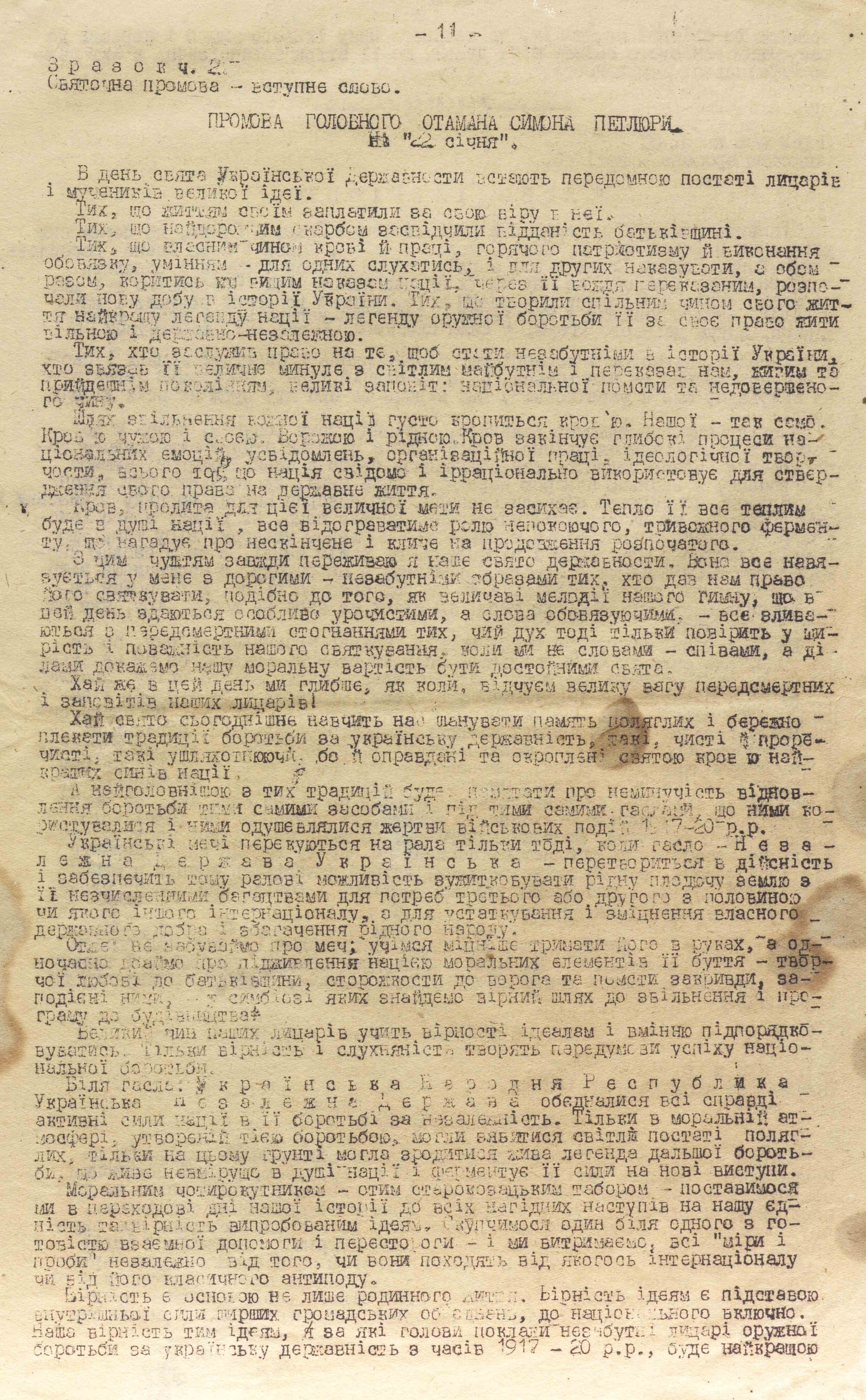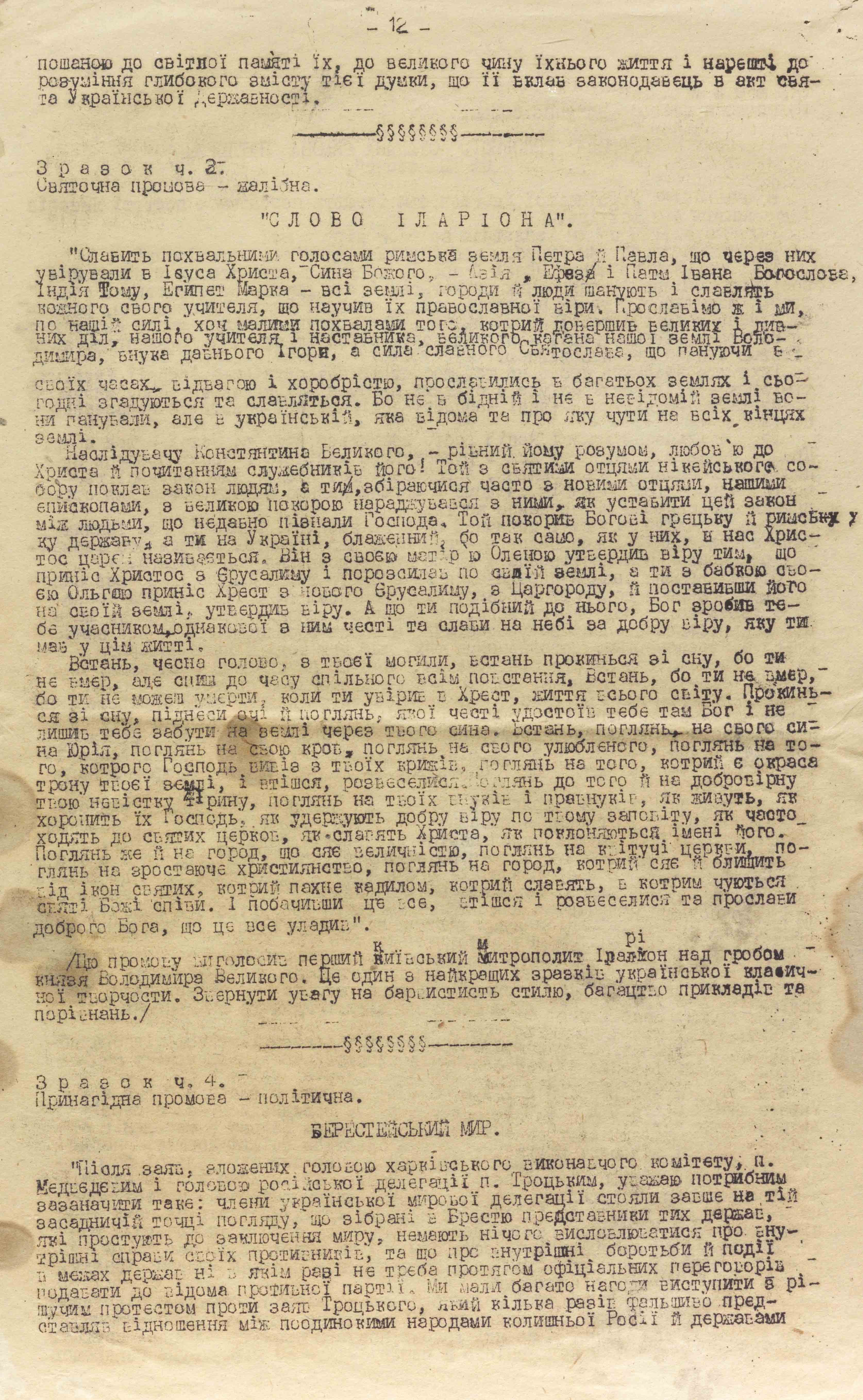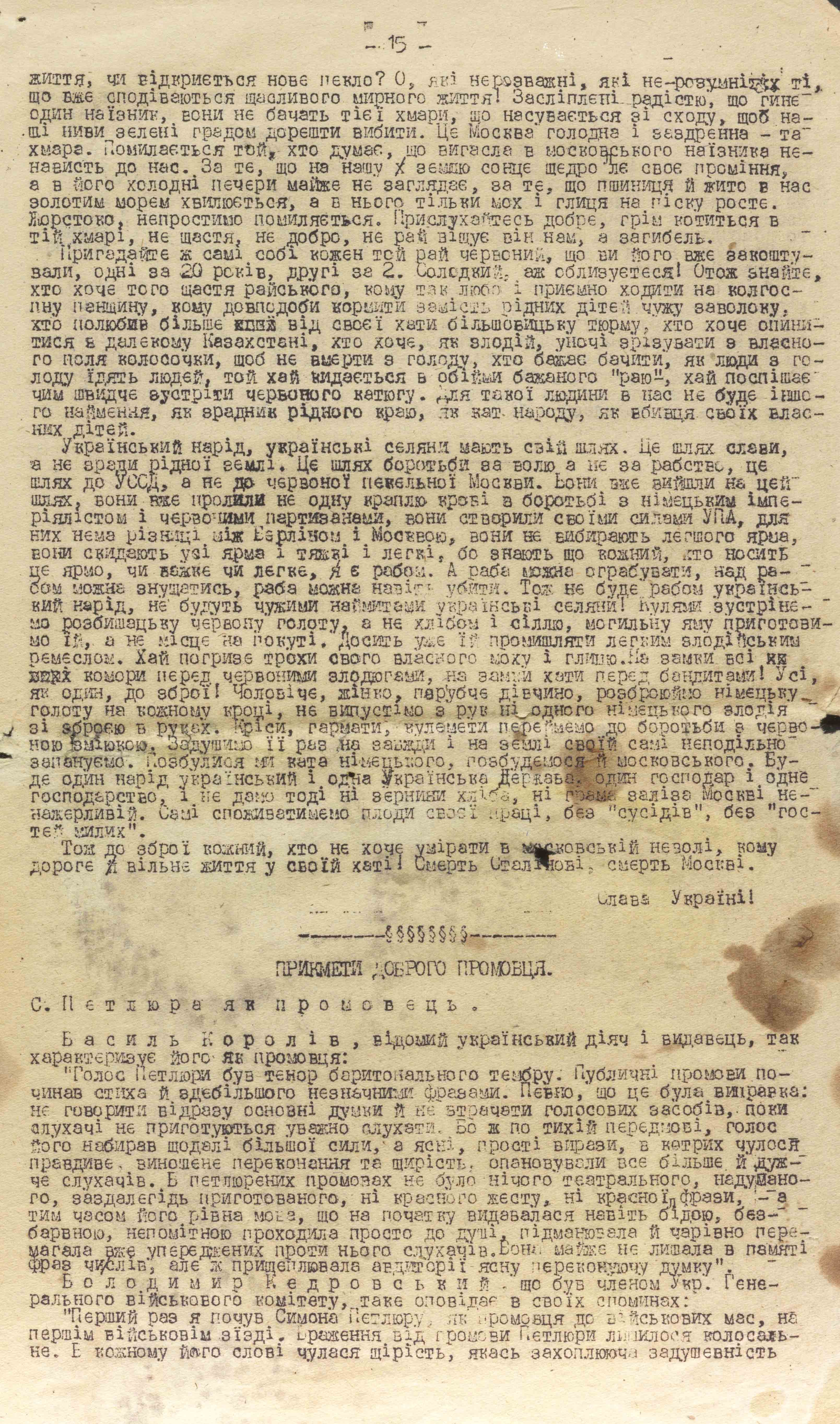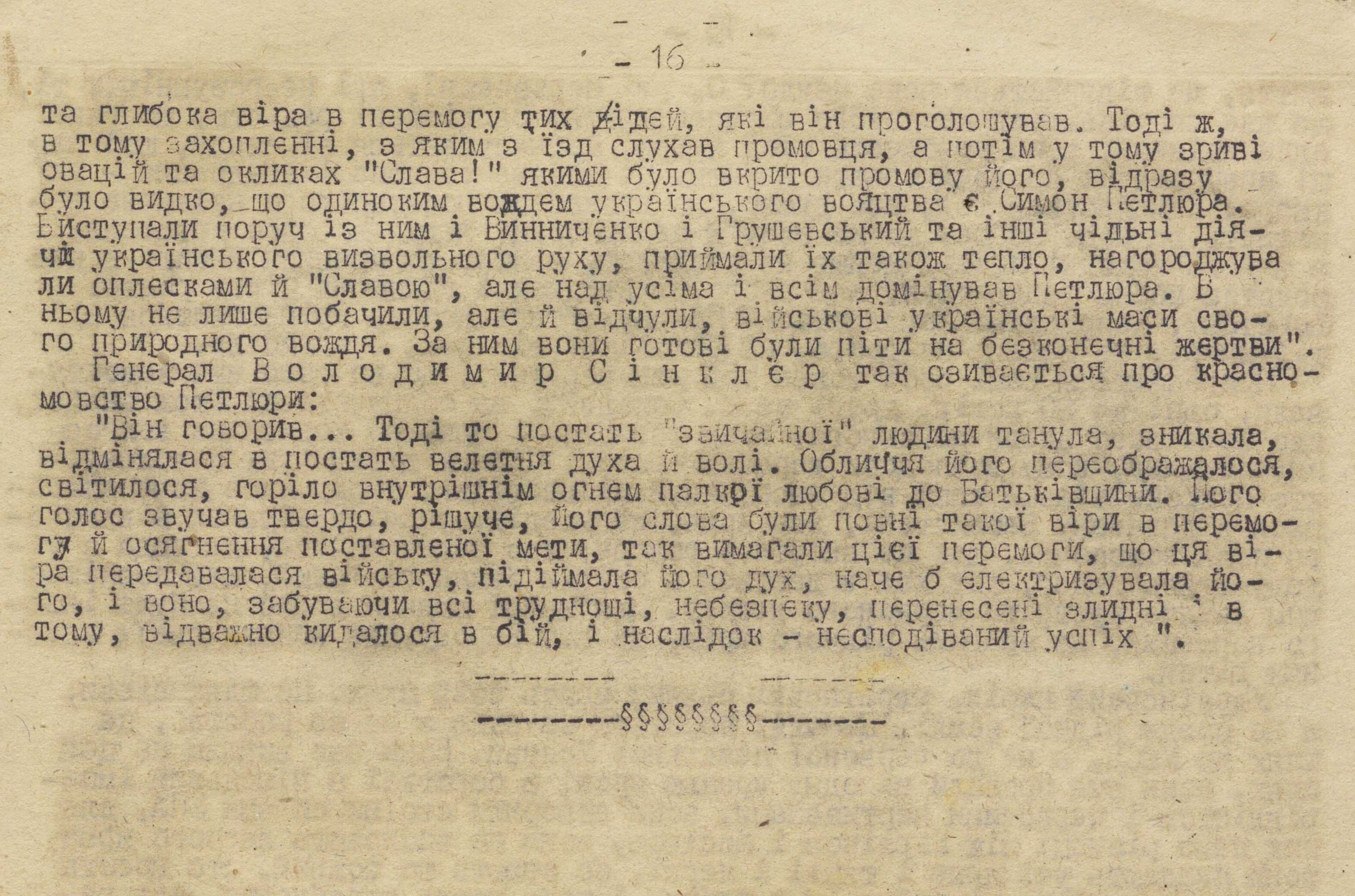Symon Petliura and the Day of Ukrainian Statehood
7/15/2025
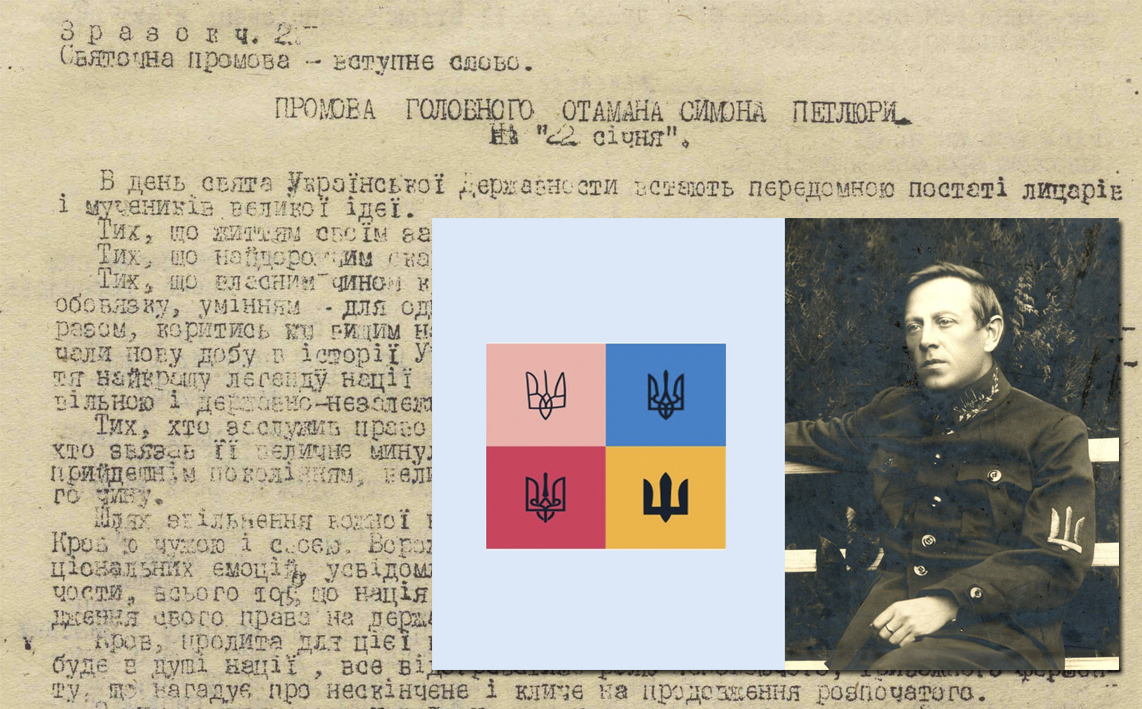
Among the declassified documents in the archival funds of the Foreign Intelligence Service of Ukraine there is the text of Head of the UPR Directorate, Chief Otaman of the UPR Army and Fleet, Symon Petliura’s speech on the occasion of the Day of Ukrainian Statehood. This text, written on yellowed paper on a typewriter, was kept by the political educator of the “Zahrava” Military District of the Ukrainian Insurgent Army, Stepan Kostetskyi, pseudonym “Zymnyi”, and served as a model for conducting educational work among the insurgents.
Along with other methodological recommendations, instructional materials, orders, notes, leaflets, and handwritten notes, the text of S. Petliura’s speech was kept, as mentioned in the documents of the mgb of the Ukrainian ssr, in the personal archive of “Zymnyi”, the Chief of the “Zahrava”’s Political Department. The archive was seized as a result of a chekist operation against UPA units in 1947 in the village of Yuzefin, then Derazhnia district, Rivne region, in the yard of Yuzef Zahorovskyi.
Familiarization with these materials makes one realize how much importance the UPA leadership attached to ideological and educational work among the insurgents, to making sure that they were politically literate, knew the history of Ukraine, knew exactly what they were fighting for and who their original enemy was.
Political educator “Zymnyi”, as evidenced by the materials seized from his archive, carefully prepared for such work, explanatory talks, which are referred to as “hutirky”. At the same time, he himself studied the art of public speaking. As an example, he took the addresses and texts of speeches by the hierarchs of the Ukrainian church and prominent figures of the Ukrainian national liberation movement, which he somehow obtained from somewhere. One of them is the sermon “The Word of Hilarion,” delivered by the first Kyivan Metropolitan Hilarion over the tomb of Prince Volodymyr the Great. “This is one of the best examples of Ukrainian classical literature,” “Zymnyi” typed under the text of the speech, “Pay attention to the colorful style, the richness of examples and comparisons”.
Among other things, “Zymnyi” added to his notes the text of a speech by Head of the UPR Directorate S. Petliura on the occasion of the Day of Ukrainian Statehood. In the information materials of the time, the Day of Unity or the day of the proclamation of the Act of Unification, which fell on January 22, was also called the Day of Ukrainian Statehood. (Today, the Day of Ukrainian Statehood is celebrated as an official state holiday on July 15, the Day of Baptism of Kyivan Rus-Ukraine).
Petliura’s speech contains many vivid examples and is quite emotional and motivational. Here is its full text:
“On the day of the holiday of Ukrainian Statehood, the figures of knights and martyrs of the great idea stand before me.
Those who paid with their lives for their faith in it.
Those who testified to their devotion to their homeland with their most precious treasure.
Those who, with their own blood and labor, fervent patriotism and fulfillment of duty, the ability – to obey for some and to command for others – but both to obey the highest orders of the nation, conveyed through its leader, began a new era in the history of Ukraine.
Those who created the best legend of the nation with their lives – the legend of its armed struggle for its right to live as a free and independent state.
Those who earned the right to become unforgettable in the history of Ukraine, who linked its great past with a bright future and passed on to us, the living and future generations, a great testament: national revenge and icompleted cause.
The path of liberation of every nation is densely sprinkled with blood. With ours too. With the blood of others and with our own. With the enemy’s and with the kindred blood. Blood completes the deep processes of national emotions, realizations, organizational work, ideological creativity, everything that a nation consciously and irrationally uses to assert its right to state life.
The blood shed for this great goal does not dry up. Its warmth will remain warm in the soul of the nation, and it will play the role of a restless, disturbing enzyme reminding us about the uncompleted and calling for the continuation of what has been started.
It is this feeling that I always experience on our holiday of statehood. It is always associated with the dear and unforgettable images of those who gave us the right to celebrate it, just as the majestic melodies of our Anthem, which seem especially solemn on this day, and the words of our national Anthem, which seem especially binding, merging with the deathbed moans of those whose spirits will only believe in the sincerity and respectability of our celebration when we prove our moral worthiness to be worthy of the holiday by our deeds, not by words and singing.
May on this day we feel more deeply than ever the great weight of the last wills and testaments of our knights!
May today’s holiday teach us to honor the memory of the fallen and to cherish the traditions of the struggle for Ukrainian statehood, so pure and prophetic, so making better, because they are justified and sprinkled with the holy blood of the nation’s best sons.
And the most important of these traditions will be to remember the inevitability of resuming the struggle with the same means and under the same slogans that were used by and inspired the victims of the military events of 1917–1920.
Ukrainian swords will be forged into plows only when the slogan – the Independent State of Ukraine – becomes a reality and provides the plows with the opportunity to exploit their fertile land with its countless riches not for the needs of the third or second and a half internationals or any other international, but for the establishment and strengthening of their own state and the enrichment of their own people.
So let’s remember about the sword, learn to hold it more firmly in our hands, but at the same time take care about nourishing the nation with the moral elements of its being – creative love for the Motherland, vigilance against enemies and revenge for the wrongs done by them – in the symbiosis of which we will find the right path to liberation and a program for construction.
The great cause of our knights teaches loyalty to ideals and the ability to obey. Only loyalty and obedience create the prerequisites for the success of the national struggle.
The slogan – “Ukrainian People’s Republic, Ukrainian Independent State”– has united all the truly active forces of the nation in its struggle for independence. Only in the moral atmosphere created by that struggle could the bright figures of the fallen appear, only on this soil could a living legend of further struggle be born, living immortally in the soul of the nation and fermenting its forces for new struggles.
In the transitional days of our history, we will stand as a moral quadrangle – that old Cossack camp – to all unworthy attacks on our unity and loyalty to our tried and true ideas. Let us gather together- shoulder to shoulder - with the readiness of mutual assistance and caution, and we will withstand all “tests and trials”, regardless of whether they come from some international or its classical antithesis.
Loyalty is the basis not only of family life. Loyalty to ideas is the basis of the internal strength of broader public associations, including national ones. Our loyalty to the ideas for which the unforgettable knights of the armed struggle for Ukrainian independence since 1917-1920 fell on the field of battle will be the best tribute to their cherished memory, to the greatness of their lives, and finally to understanding the deep meaning of the idea that the legislator put into the act of the holiday of Ukrainian Statehood”
(FISU. – F.1. – Case 7335. – P. 124-125).
At the same time, a shown by the archival documents, “Zymnyi” not only used such speeches in his work and took them as a model. He himself tried to learn and imitate authoritative speakers. In his notes entitled “Features of a Good Speaker”, he published the statements of his contemporaries about S. Petliura as a speaker. In particular, he recorded the statements by Vasyl Koroliv (“Staryi”), a Ukrainian public figure, writer, publisher, and member of the Ukrainian Central Rada.
“Petliura’s voice,” Koroliv recalled, “was a tenor of baritone timbre. He would begin his public speeches quietly and mostly with insignificant phrases. It was probably a rule: not to say the main ideas at once and not to waste vocal means until the audience was ready to listen attentively... After a quiet introduction, his voice gained more and more strength, and clear, simple expressions, in which one could hear true, bred conviction and sincerity, captured more and more listeners. There was nothing theatrical, contrived, pre-seasoned, or pretentious in Petliura’s speeches, not a single beautiful gesture or beautiful phrase, yet his smooth speech, which at first seemed even pale and colorless, imperceptibly came to the heart, lured and magically won over the listeners who had been prejudiced against him. It left almost no phrases or words in the memory, but it instilled in the audience a clear, convincing idea”.
(FISU. – F.1. – Case 7335. – P. 128).
Along with this, he cited the statements of Volodymyr Kedrovskyi, a publicist, Colonel of the UPR Army, Chief of the State Inspectorate of the UPR Army. He spoke about S. Petliura’s oratorical talent:
“The first time I heard Symon Petliura speak to the military masses was at the First Military Congress. The impression of Petliura’s speech was enormous... In every word he spoke, one could hear sincerity, some kind of admirable sincerity and deep faith in the victory of the ideas he proclaimed. At the same time, in the enthusiasm with which the Congress listened to the speaker, and then in the burst of applause and cries of “Glory!” that covered his speech, it was immediately clear that Symon Petliura was the true leader of the Ukrainian military. Vynnychenko, Hrushevskyi, and other prominent figures of the Ukrainian liberation movement spoke alongside him, and they were also warmly received, rewarded with applause and “Glory”, but Petliura dominated everyone and everything. The Ukrainian military masses not only saw in him, but also sensed in him their natural leader. For him, they were ready to make endless sacrifices”.
(FISU. – F.1. – Case 7335. – P. 128-129).
“Zymnyi” also quoted Volodymyr Sinkler, a Lieutenant General of the UPR Army, about S. Petliura’s eloquence:
“He spoke... And then the figure of an ‘ordinary’ person melted, disappeared, and was replaced by the figure of a giant of spirit and strength of will. His face was transformed, glowing, burning with the inner fire of ardent love for the Motherland. His voice sounded firm, decisive, his words were full of such faith in victory and the achievement of the goal, so demanding of this victory that this faith was transmitted to the Army, raised its spirit, as if electrified it, and it, forgetting all the difficulties, danger, poverty and fatigue, bravely rushed into battle and the result was an unexpected success.”
(FISU. – F.1. – Case 7335.– P. 129).
These notes, which were carefully collected, recorded, and used in his work by the UPA political educator “Zymnyi” in the underground, are evidence of how at all times in Ukrainian history its creators and leading figures attached importance to defining milestones, in particular the holiday of Ukrainian Statehood, filling this date with deep meaning and were able to speak about it vividly and convincingly, thus fueling the morale of the nation.
